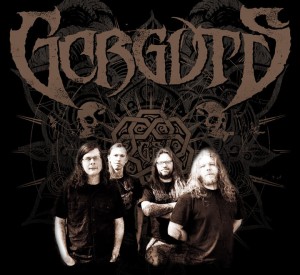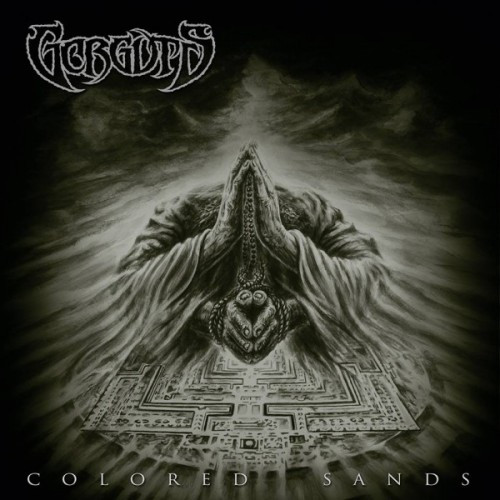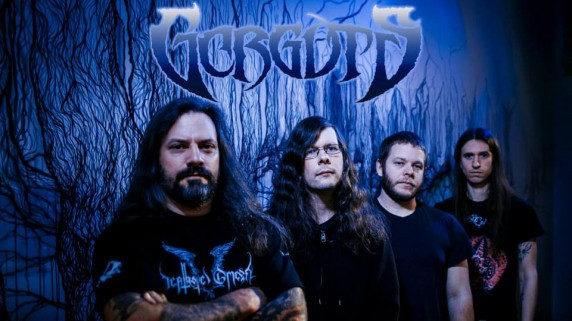Luc Lemay clearly has a split personality. One of them is a modernist composer, capable of creating intricate, avant-garde pieces fit for performance by a chamber orchestra, but transposed to the standard gear of a metal band. The other is a ravenous beast the size of a house. Gorguts’ new album, Colored Sands, is the result of a beautiful partnership between those two unexpectedly amicable facets of Lemay’s personality.
But although Lemay may be the visionary-in-chief of this ground-breaking band, it must quickly be said that Colored Sands owes much to the other people he enlisted for the first Gorguts recording in more than a decade. Guitarist Kevin Hufnagel and bassist Colin Marston added their own string arrangements to Lemay’s compositions, in addition to each writing a song of his own for the album, and drummer John Longstreath stands out every bit as much, throughout the album, as the trio of other unusually skilled performers.
Given the impressive collection of talent behind the new release and the reverence with which Gorguts’ previous albums are discussed among serious aficionados of technical death metal, expectations for Colored Sands have been high. Under those circumstances, the current foursome would be forgiven if they had fallen short, but they didn’t.
As expected, the songs are complex and dynamic. Although the music is most often fast-paced, the tempos and rhythmic patterns are in almost constant flux, and the intensity of the sound changes unexpectedly as well, moving from tumultuous warlike assaults to relatively quieter passages in which guitar-and-bass duets are to be found or alien arpeggios reverberate over a groaning or jabbing low end. Songs like “An Ocean of Wisdom” and “Ember’s Voice” include screaming eruptions of guitar shred, and there’s a lot of spidery fretwork on display almost constantly.
Yet this isn’t a “blizzard of notes” brand of technical death metal, in which sheer athleticism substitutes for musical ideas and the risk of monotony increases with the passage of time. Despite the intricacy of the playing, the frequent density of the musical moving parts, and the rapidly-changing structures of the songs, it’s a surprisingly atmospheric album. And the atmosphere is mostly deep, dark, and ominous. While the music includes its fair share of extravagant technical flourishes, even verging on the experimental at times, it’s still undeniably death metal — potent and often brutal.
The melodies are dissonant, with the lead guitars tracing spacey minor-key arpeggios and ringing like warped bells. In fact, there’s virtually nothing about the melodic aspect of the songs that isn’t strange. But while you may not find yourself humming the tunes hours after hearing them, they do have a way of lodging in your head, at least to the point that once you dive into a particular track again, you remember what’s coming — and you look forward to it.
Apart from the otherworldly ambience of the melodies, the dark atmosphere of the album is attributable to the absolutely crushing brutality of the music when Gorguts are in attack mode — which is almost all the time. “Heavy” and “crushing” aren’t adjectives that always come to mind when I think of technical death metal, but most of the time Colored Sands is simply massive. So much of this feeling comes from John Longstreth’s drumming — and the tone of the drums — particularly when combined with the low-tuned riffs and groaning bass lines. The thundering toms sound like timpani, and when the double-bass kicks explode, it’s like an earthquake. The production quality and mixing of the album couldn’t be better.
 The perfectly engineered power of the rhythm section is unleashed time and again, and every time it happens, it’s an overwhelming experience, like being caught between a steamroller and a pile-driver. Even in slower sections, such as the doomed, lumbering stomp near the end of “Le Toit du Monde”, it’s overpowering. There’s a militaristic feel to the rhythmic assault of “Enemies of Compassion”, and the sense of being subjected to merciless hammer blows in “Ember’s Voice”. But the most thoroughly catastrophic and compelling passages come in the latter halves of “Forgotten Arrows” and the title track. There, everything gets smashed flat by thundering grooves.
The perfectly engineered power of the rhythm section is unleashed time and again, and every time it happens, it’s an overwhelming experience, like being caught between a steamroller and a pile-driver. Even in slower sections, such as the doomed, lumbering stomp near the end of “Le Toit du Monde”, it’s overpowering. There’s a militaristic feel to the rhythmic assault of “Enemies of Compassion”, and the sense of being subjected to merciless hammer blows in “Ember’s Voice”. But the most thoroughly catastrophic and compelling passages come in the latter halves of “Forgotten Arrows” and the title track. There, everything gets smashed flat by thundering grooves.
Luc Lemay’s vocals also have much to do with the harsh, doomed aura of the music. His primal howls and gargantuan, throaty roars add an air of the bestial to the proceedings, and in the album’s frenzied closing track (“Reduced To Silence”), when all the instruments are let completely off the leash, he sounds downright crazed.
********
In 1950, Communist China invaded Tibet, with the invasion culminating at a battle that proved to be Tibet’s final, futile resistance to subjugation by its more powerful neighbor. In the center of this album, “The Battle of Chamdo” commemorates that turning point. It’s a classical composition by Lemay, occasionally verging on the lush but more often strident and ultimately sad, and it’s performed entirely by a string quintet — two violins, a viola, a cello, and a double bass. It comes as a big surprise, which I guess I’ve just spoiled for anyone reading this, and it’s not just an isolated reference.
In fact, the entire album (including the title) was inspired by Lemay’s interest in Tibetan history, culture, and tragic fate. Apart from what sounds like the low tones of throat-singing accompanied by acoustic guitar at the end of “An Ocean of Wisdom”, however, the influence of the subject matter on the music isn’t overt. Rather than incorporating ethnic melodies, it seems that Lemay instead translated his feelings about what he finds both spiritual and tragic about the subject matter into the sensations of the music. Fortunately, his bandmates seem to have melded themselves seamlessly into the aesthetic he was trying to achieve, even in the two songs written by Hufnagel and Marston.
But you need not know anything about Lemay’s inspiration to appreciate the album. Colored Sands is one of the year’s true high points, a bold, creative union of intricate songwriting, technically masterful performances, and absolutely crushing death metal heaviness. Highly recommended.
********
Colored Sands will be released by Season of Mist and can be pre-ordered here in a variety of formats. Three songs have been released for streaming so far — “Forgotten Arrows”, “An Ocean of Wisdom”, and “Colored Sands” — and here they are:
https://www.facebook.com/GorgutsOfficial/
http://gorguts.bandcamp.com/album/colored-sands



This is probably the best / my favorite metal album that I have listened to yet this year.
All hail the return of Gorguts. Honestly, this is an incredibly strong AotY contender.
Kings of death metal.
what i’ve heard so far from this album sounds awesome, i can’t wait to hear the rest of it
I did feel a bit edgy on the modern history part of Tibet (because my country’s face is damaged, good god). But I realised I knew little about Tibet’s history (shame), and there is no standpoint for defensiveness. However all the rants, either from the western or ourselves, make me want to go there (I heard it’s beautiful) and experience the culture myself. Afterall history is always interpreted in favour of certain purpose or belief. Then I remembered Exodus wrote a song called Nanking, so I’m good. My rant is over.
There’s a very good interview of Luc Lemay over at Metal Injection, which I recommend. It included this part, when he was asked if he had ever visited Tibet:
“No, never, but with this record, I did that with no pretension of knowing their culture. I read books, like anyone would read books and I’m just telling how I feel about this, how I’m amazed about the beauty of this culture, and now I’m shocked about the tragic fate of those people. It’s just my angle. I don’t have pretension of saying this is how it is, this is what’s going on. This is just my very modest look at this culture, because dude, you can study this culture for twenty-five, thirty years before knowing what you’re talking about. I wanted to bring an epic sense, a story telling side. I don’t want to take a political voice here and say, “Don’t buy China!” Never, ever in my lyrics do I mention the Chinese being the oppressor or the bad people.”
http://www.metalinjection.net/interviews/luc-lemay-of-gorguts-discusses-the-bands-first-album-in-12-years-the-death-to-all-experience-a-missed-collaboration-and-more
Thanks for the link. It is more informative. He seems to have a understandable intention and a moderate attitude. That is mostly welcome.
He seems like a modest person for someone so talented, which is always a welcome discovery. 🙂
Cannot wait to physically buy the new album.
Luc seems like a cool guy.
FFFUUUU… One has missed out on a month of listening to this! One only noticed today that the album is up on Bandcamp.
Hey brilliant review, enjoyed the read. Didn’t realise the Tibetan influence until reading this!. Feel free to check out our (Metal Music Blog) review linked below \m/
http://wp.me/p3glUC-i3